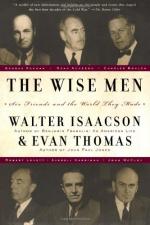
|
| Name: _________________________ | Period: ___________________ |
This quiz consists of 5 multiple choice and 5 short answer questions through Chapter 24.
Multiple Choice Questions
1. Where did John McCloy attend College according to Isaacson?
(a) Oxford.
(b) Harvard.
(c) Yale.
(d) Amherst.
2. Who coined the term "Iron Curtain" in a cable to President Truman?
(a) George Kennan.
(b) Winston Churchill.
(c) Henry Stimson.
(d) John McCloy.
3. Under which president did Dean Acheson serve in the Attorney General's office?
(a) Calvin Coolidge.
(b) Harry Truman.
(c) Franklin Roosevelt.
(d) Herbert Hoover.
4. What was the ratio of students who passed the training for Kennan's chosen field to those who took the course, according to Isaacson?
(a) 110:160.
(b) 1:11.
(c) 110:16.
(d) 16:110.
5. What does Isaacson claim to be Harriman's first crusade in his role with the Roosevelt Administration?
(a) To make rail transportation the exclusive means of transporting military equipment within the U.S. borders.
(b) To encourage the Fed to make low interest loans to investment banks.
(c) To gain federal funding for expanded rail road construction.
(d) To encourage the government to help increase the nation's rail freight capabilities.
Short Answer Questions
1. For what purpose had Robert Lovett's father been grooming him and Averell Harriman since their graduation from college, according to Isaacson?
2. Who does Isaacson record to be the first Democrat candidate for president in 1952 after President Truman announced he would not seek re-election?
3. What does Isaacson claim to be the goal of the "Wise Men"?
4. What quality made Lovett and McCloy influential insiders, according to Isaacson?
5. Which of the "Wise Men," according to Isaacson, attended The Hill School in Philadelphia?
|
This section contains 339 words (approx. 2 pages at 300 words per page) |

|




